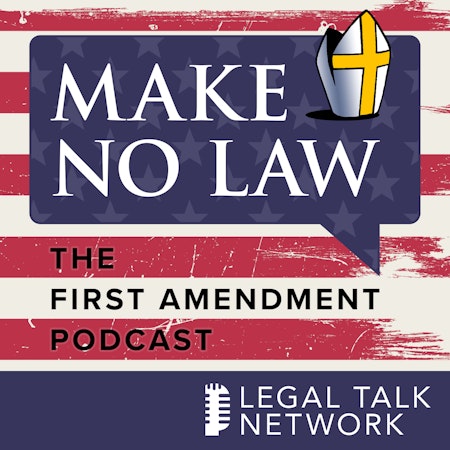
Make No Law: The First Amendment Podcast
Ken White explores the background of important First Amendment cases and the personalities and history that led to them. Join Ken, First Amendment litigator and law blogger at Popehat.com, as he interviews some of the people behind America’s most important free speech cases.
1
The F-Bomb
On April 26, 1968, Paul Robert Cohen walked down the corridor of the Los Angeles County Courthouse at the corner of Grand and 1st. He didn’t start a fight, he didn’t make any threats, he didn’t even hold up a sign, but he did wear a jacket. This...
26 min
2
Imminent Lawless Action
In 1919, The US Supreme Court in Schenck v. United States established the rule that if words create a "clear and present danger" to incite criminal activity or violence, the government has the right to prevent and punish that speech. For nearly fifty...
33 min
3
I Know It When I See It
How do you know when something’s obscene? It’s not exactly an easy question. Plenty of now respected works were, at one point, declared obscene and subject to judicial scrutiny - James Joyce’s Ulysses, Allen Ginsberg’s Howl, and George Carlin...
26 min
4
Deplatformed: Social Media Censorship and the F...
Politically conservative voices have been arguing recently that social media outlets such as Twitter, Facebook, and Youtube have been illegally censoring their views. They claim, as a result of their political leanings, that they are being...
26 min
5
Gag
Criminal or civil, plaintiff or defendant — what’s the one piece of legal advice all should follow? Shut up! That being said, should a judge be able to make you do this? In this episode of Make No Law, the First Amendment Podcast by Popehat.com,...
31 min
6
The F-Bomb
On April 26, 1968, Paul Robert Cohen walked down the corridor of the Los Angeles County Courthouse at the corner of Grand and 1st. He didn’t start a fight, he didn’t make any threats, he didn’t even hold up a sign, but he did wear a jacket. This...
26 min
7
Bonus: The Mailbag Episode
While the idea of free speech seems straightforward enough, its execution can be a little messy. Current events especially have underscored the complexity of what is protected by law and what is a punishable offense. Luckily, there are First Amendment...
33 min
8
Fighting Faiths
Everyone loves a good redemption story. Maybe that's because it helps us believe it's never too late to change. But how does the same Justice who decided Schenck v. United States, a low point for First Amendment jurisprudence, become the ultimate...
27 min
9
Fire in a Crowded Theater
“You can’t yell ‘fire’ in a crowded theater” is one of the most commonly used First Amendment catchphrases -- but does it really support exceptions to free speech? The answer to this question can be found in the writings of Supreme Court...
28 min
10
Street
What pushes a 51 year-old decorated World War II veteran to burn the American flag? In June of 1966, Sidney Street heard the news that James Meredith, an icon of the Civil Rights Movement, had been shot on the second day of his March Against Fear....
32 min
11
Crush
The Animal Crush Video Prohibition Act of 2010 was an animal cruelty prevention law aimed at videos showing women in high heels crushing small animals. While the law took aim at these videos, it ended up being used to target Robert Stevens instead....
36 min
12
Disparagement, Contempt, and Disrepute
Simon Tam named his band “The Slants” as a way to fight back against racism and take back the word as a form of self-empowerment. But when he tried to register the name as a trademark, the United States Patent and Trademark Office (PTO) denied the...
26 min
13
On The Job
When Richard Ceballos, a deputy district attorney in Los Angeles County, expressed concern about the validity of a search warrant in 2000, he discovered the fuzzy line between free speech rights and the need for government entities to maintain...
23 min
14
The Schoolhouse Gates
In late 1965, a 13-year-old student named Mary Beth Tinker wore a black armband to Warren Harding Junior High School in Des Moines, Iowa, to support a truce in the Vietnam war. The school suspended Mary Beth Tinker for violating a a policy the...
32 min
15
Fighting Words
On April 6, 1940, a Jehovah's Witness named Walter Chaplinsky was arrested for yelling, “You are a God damned racketeer and a damned Fascist and the whole government of Rochester are Fascists or agents of Fascists” at a Rochester, New Hampshire...
29 min